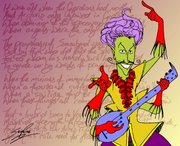Towbee
Towbee, the Space Minstrel
The "minstrel of space," a seemingly care-free and "happy wanderer among the stars" who visits Earth in January 1973 and descends in his space ship to twenty-two thousand miles above Metropolis for the express purpose of drawing out Superman. Towbee exclaims that he has exhausted his repertoire of stories and wishes to create a new one about the Man of Steel so that he will have something to "sing to lonely space-voyagers" (Act No. 420: "The Made to Order Menace!").
Towbee's instrument, a "screensong," can cast solid images and sounds that apparently take on a life of their own. Towbee initially uses this instument to create a "drooling little monster," a repulsive winged flying lizard, whom he names Artnig, then lets it loose in the skies over Metropolis and sits back to see what will happen.
The lizard snatches up Clark Kent in its talons, and dramatically dangles the disguised Superman over the city, where, exposed to public view, Superman is unable to change to his Superman costume. He eventually succeeds in discreetly using his the inhalation of his super-breath to draw the smoke-stack smoke of a nearby factory toward himself in order to block his costume change from view. Towbee realizes that Superman will not act openly as Superman while in disguise as Clark Kent, so he uses his screensong to quickly fashion a stand-in. Superman goes into action, but is then surprised to discover that an exact doppleganger of Clark Kent is now astride the flying space lizard in his place, crying for help.
Superman tracks down Towbee, wondering why "these interplanetary meddlers can't understand that messing around with the lives of humans isn't right!" and disposes of the flying menace by molding a "big wad of molten plastic" into a giant lens consisting of a series of prisms that focus the sun's rays on the lizard in such a manner that it dissolves. (Act No. 420: "The Made-to-Order Menace!").
Towbee leaves the Solar System with his "tale to sing across the galaxy" and eventually writes his own equivalent of an epic poem about the incident.
